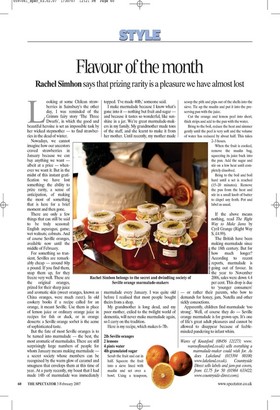Flavour of the month
Rachel Simhon says that prizing rarity is a pleasure we have almost lost Looking at some Chilean strawberries in Sainsbury's the other day, I was reminded of the Grimm fairy story 'The Three Dwarfs', in which the good and beautiful heroine is set an impossible task by her wicked stepmother — to find strawberries in the dead of winter.
Nowadays, we cannot imagine how our ancestors craved strawberries in January because we can buy anything we want — albeit at a price — whenever we want it. But in the midst of this instant gratification we have lost something: the ability to prize rarity, a sense of anticipation, of making the most of something that is here for a brief moment and then gone.
There are only a few things that can still be said to be truly seasonal: English asparagus; game; wet walnuts; cobnuts. And of course Seville oranges, available now until the middle of February.
For something so transient, Sevilles are remarkably cheap — around 60p a pound. If you find them, snap them up, for they freeze very well. These are the original oranges, prized for their sharp juice and aromatic skin (sweet oranges, known as China oranges, were much rarer). In old cookery books if a recipe called for an orange, it meant Seville. Use them in place of lemon juice or ordinary orange juice in recipes for fish or duck, or in orange desserts: a Seville orange sorbet is the acme of sophisticated taste.
But the fate of most Seville oranges is to be turned into marmalade — the best, the most aromatic of marmalades. There are still surprisingly large numbers of people for whom January means making marmalade — a secret society whose members can be recognised by the warm glow of caramel and smugness that envelops them at this time of year. At a party recently, my boast that I had made 141b of marmalade was immediately topped. 'I've made 401b,' someone said.
I make marmalade because I know what's gone into it — nothing but fruit and sugar — and because it tastes so wonderful, like sunshine in a jar. We're great marmalade-makers in my family. My grandmother made tons of the stuff, and she learnt to make it from her mother. Until recently, my mother made marmalade every January. I was quite old before I realised that most people bought theirs from a shop.
My grandmother is long dead, and my poor mother, exiled to the twilight world of dementia, will never make marmalade again, so I carry on the tradition.
Here is my recipe, which makes 6-71b.
2Ib Seville oranges 2 lemons 4 pints water 4Ib granulated sugar Scrub the fruit and cut in half. Squeeze the fruit into a sieve lined with muslin and set over a bowl. Using a teaspoon, scoop the pith and pips out of the shells into the sieve. Tie up the muslin and put it into the preserving pan with the juice.
Cut the orange and lemon peel into short, thick strips and add to the pan with the water.
Bring to the boil, reduce the heat and simmer gently until the peel is very soft and the volume of water has reduced by about half. This takes 2-3 hours.
When the fruit is cooked, remove the muslin bag, squeezing its juice back into the pan. Add the sugar and stir on a low heat until completely dissolved.
Bring to the boil and boil hard until a set is reached (15-20 minutes). Remove the pan from the heat and stir in a small knob of butter to dispel any froth. Pot and label as usual.
If the above means nothing, read The Right Way to Make Jams by Cyril Grange (Right Way S; £4.99).
The British have been making marmalade since the 18th century. But for g how much longer? k' According to recent reports, marmalade is going out of favour. In -8 the year to November 2006, sales were down 4.4 per cent. This drop is due to 'younger consumers' or rather their parents, who bow to demands for honey, jam, Nutella and other sickly concoctions.
Apparently, children find marmalade 'too strong'. Well, of course they do — Seville orange marmalade is for grown-ups. It's one of life's great adult pleasures and cannot be allowed to disappear because of feebleminded pandering to infant whim Wares of Knutsford (08456 121273; www. waresofknutsford.co.uk) sells everything a marmalade-maker could wish for. As does Lakeland (015394 88100; www.lakeland.co.uk). Countryside Direct sells labels and jam-pot covers, from £1.75 for 50 (01984 633422; www.countryside-direct.com).




















































 Previous page
Previous page